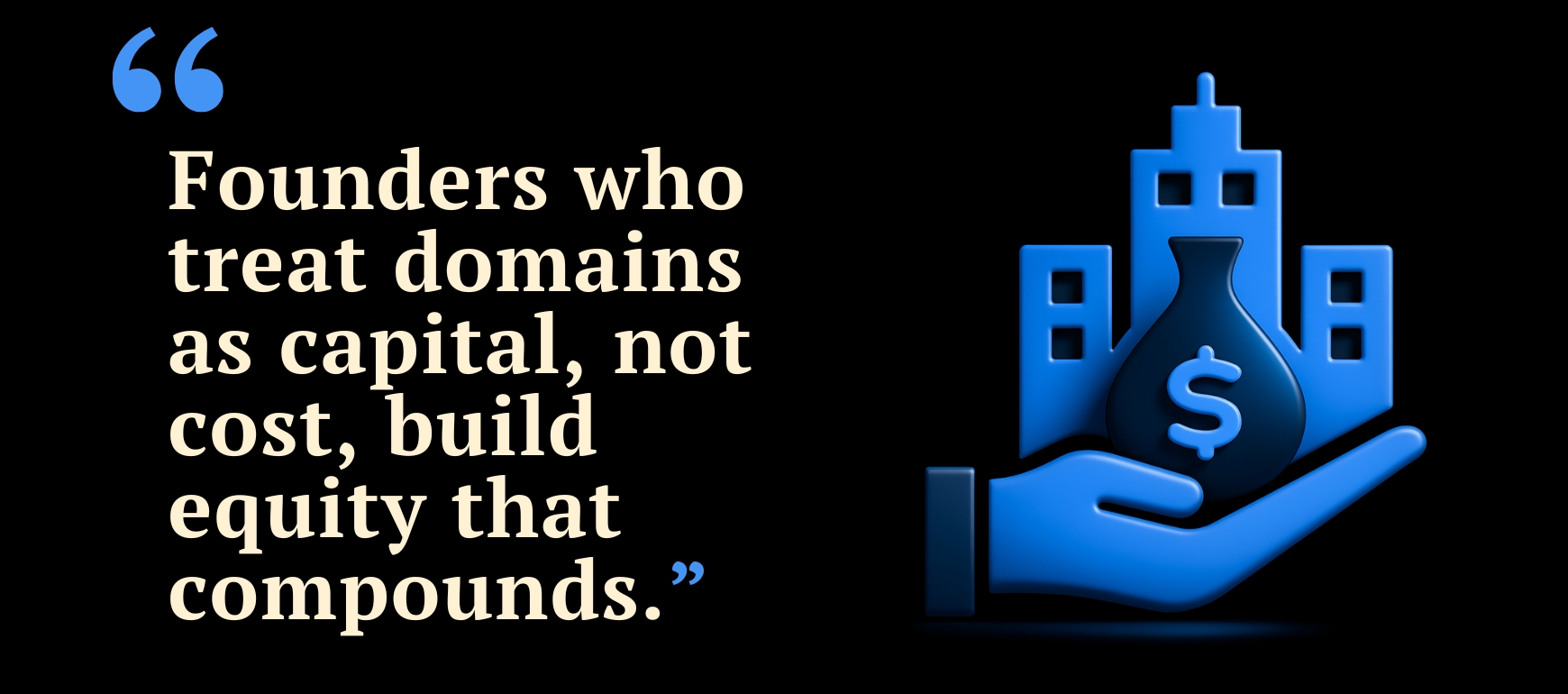Domains are durable, unique and valuable digital assets with measurable financial impact. They shape trust, lower customer acquisition cost (CAC), improve conversion, support pricing power, and lift exit multiples. Yet they are too often treated as marketing spend rather than balance-sheet assets. For founders, owners, and investors, applying clear valuation methods and flexible deal structures is key to unlocking the full potential of domain names.
This article outlines the value drivers, frameworks, and structures that make domains a practical, finance-grade asset class.
Key value drivers:
Trust and conversion – Clear, credible domains reduce friction, improve conversion, and strengthen LTV/CAC ratios, increase revenue quality and valuation.
CAC efficiency – Memorable names drive direct navigation and brand recall, reducing dependence on volatile paid channels and lowering burn.
Strategic moat – Features can be cloned, but identity endures. A credible domain signals permanence and supports trust, conversion, and pricing power.
Balance-sheet impact – Domains can be capitalized as indefinite-lived intangibles, representing avoided “marketing rent” and supporting stronger M&A multiples.
Market Snapshot
Global Registration Growth & Scale
- As of Q2 2025, total domain registrations reached 371.7 million, up 9.3 million domains year-over-year (+2.6 %) and +0.9 % quarter-on-quarter.
- The .com + .net base holds ~170.5 million registrations, growing modestly (0.4 % YoY) in a strong quarter.
- New generic TLDs (ngTLDs) remain a fast-growing segment: in Q1 2025, ngTLDs jumped ~13.5 % YoY.
Aftermarket Sales & High-End Volume
- High-end domain sales in 2025 already include Icon.com at $12M (the top publicly reported sale year-to-date)
- Other major sales include Commerce.com (~$2.44M) and Fuse.com (~$2.13M) among the top public trades.
Sector Trends & Thematic Tailwinds
- Brandability over Keywords: Survey data suggests 37 % of owners now prefer brandable (versus keyword-rich) domains; 24 % still favor pure keyword names.
- Localized & Geo Domains: City-TLDs (e.g. .berlin, .tokyo) are gaining relevance in hyperlocal marketing efforts -for events, municipal branding, and local platforms.
- Domain Strategy in Naming Choice: Analysis of 5,000 startup domain purchases shows founders increasingly emphasize phonetic appeal, brevity, and emotive resonance, not just keywords.
Valuation Playbook
Domains, like other intangible assets, derive value from multiple dimensions. Borrowing from established methods in trademark and IP valuation, the following four lenses provide a structured way to capture that value. Taken together, they transform what might seem like intuition into a finance-grade framework that investors, owners, and founders can rely on for strategic decisions.
Income approach: relief-from-royalty
This method asks a simple question: what would it cost to rent a weaker domain instead of owning the stronger one outright? Analysts estimate a notional royalty rate a company would pay to license a comparable but inferior name, then capitalize those savings against projected brand revenues.
Cars.com applies this framework directly on its balance sheet, carrying the domain as an $872M indefinite-lived intangible tested annually using relief-from-royalty.
The LasVegas.com agreement followed a similar logic: VEGAS.com, LLC committed to an installment purchase structure disclosed in SEC filing, $12M upfront plus escalating monthly payments that could total nearly $90M through 2040 before ownership transferred. The structure effectively treated the domain as a long-term stream of avoided rent.
If a company is expected to generate $50M in annual revenue and the fair royalty rate on a weaker name is 1%, the “avoided cost” of owning the stronger domain is $500,000 per year. Discounted over time, this can justify multi-million-dollar valuations.
In simple terms, a great domain is like property you don’t have to rent forever, owning it saves you money year after year.
Market approach: comparable sales
Just like real estate, domain names can be benchmarked against recent sales of similar properties. Relevant comparables include word length, extension (.com, .io, .ai, etc.), category relevance, type-in potential, and overall brandability. Weighting is important, .com sales carry more weight because liquidity and resale depth are far stronger than in newer extensions. For example, Chat.com at over $15M and Gold.com sold for $8.5M provide clear benchmarks for short, category-defining names, while mid-tier sales of two-word .coms in the low-six-figure range set context for less rare inventory.
Still, value is often in the eye of the beholder: strategic fit, timing, and buyer need can push outcomes well above or below benchmarks.
Domain quality screen (go/no-go)
Not every name is created equal, so it helps to apply a structured filter before running numbers. Useful criteria include clarity, ease of spelling, memorability, category relevance, and global adaptability.
A name like Ride.com ticks nearly all the boxes: short, clear, and applicable to multiple industries, which explains why it would attract strategic pricing.
By contrast, BestUsedCarsClevelandOhio.com may have situational value to one operator but limited portability or resale appeal. Domains that materially influence perception and acquisition efficiency are the ones that justify a valuation uplift.
Operational uplift model
Valuation can be grounded in measurable operating improvements. Stronger domains can increase click-through rates on branded search, drive more direct navigation, improve email deliverability (fewer bounces, less confusion), and boost PR and social pickup. They also tend to support better pricing power by signaling trust. Each of these factors ties back to CAC and revenue.
Public.com saw 2–3× higher digital conversions and 50–100× better offline ad recall after upgrading.
Dave.com reported higher sign-ups after moving from “TryDave.com”.
Teamwork.com won larger enterprise customers after upgrading from TeamworkPM.net.
In another case, Mint.com gave ~5% equity for its domain, which turned into ~$8M at exit.
And Ring.com’s founder estimated the $1M domain added $30 - 50M in business value.
If moving from a two-word domain to a clean exact-match domain improves branded search CTR by 20% and reduces paid ad spend by $500k annually, that operational uplift flows straight into enterprise value.
Portfolio Construction for Investors
Domains are increasingly managed as a sub-sleeve of brand IP within alternative or growth-infrastructure allocations. In practice, institutions apply familiar disciplines from digital-asset and intangible-asset investing:
1. Sizing: Allocations are typically nominal in scale, since even small exposure can influence brand outcomes. Single-name risk is monitored to avoid concentration.
2. Benchmarking: Some policy benchmarks now incorporate domains to reduce off-benchmark exposure and tracking error.
3. Liquidity: Category-defining names transact less frequently, but clear at meaningful prices. Portfolios often balance longer-term holds with tradable assets.
4. Governance: Acquisition thesis, valuation method, and legal hygiene (UDRP, trademark checks) are documented, with impairment testing aligned to other indefinite-lived intangibles.
5. Stakeholder education: Analogies from trademark and digital-asset investing are used internally to build consensus and clarify treatment.
Deal Structures that Make Domains Accessible to Startups
Securing a Strategic-Grade domain name doesn’t have to drain cash reserves. Founder-friendly deal structures can bridge the gap between owner expectations and startup resources, aligning interests while preserving runway.
Cash + equity
Structures where a portion is paid upfront in cash, with the balance delivered in common or preferred equity at the round’s share price. Equity components sometimes include information rights or transfer restrictions.
Cash + revenue share (time-boxed)
Combinations of modest cash plus a capped percentage of top-line revenue for a fixed period, typically 24–36 months, where a clear monetization model is present.
Optioned acquisition
Arrangements granting exclusive use of the domain with a call option to purchase at a predetermined price. Frequently used in early product or pre-market-fit stages.
Lease-to-own
Monthly payments credited toward a strike price, creating a defined path to ownership while avoiding perpetual lease structures.
Earn-out triggers (Milestone-based payouts)
Equity or cash tranches released when specific milestones are reached, such as ARR thresholds, Series A completion, or MAU metrics.
Risk management: Regardless of structure, domain transactions typically include safeguards to protect both sides. Standard measures include assignment agreements, verified chain of title, registrar transfer, escrow services, and trademark checks to mitigate legal and operational risk.
Case Notes
Teem.com- Cash + 1.5% equity
EventBoard acquired Teem.com from Rick Schwartz with cash and a 1.5% stake. When Teem was sold in 2018, the equity paid out ~$643k, bringing Schwartz’s total return near $800k.
Dropbox.com - Cash vs. stock
In 2009, Dropbox offered the domain owner $300k or stock. The seller chose cash; the foregone equity would later have been worth hundreds of millions.
Uber.com - 2% equity
Universal Music traded Uber.com for 2% of Uber, valued at ~$107k at the time. Universal later sold back for $863k; if held through IPO, the stake would have been worth ~$532m.
Brew.com - Cash + undisclosed equity
Michael Cyger sold Brew.com under a cash-plus-equity deal with a beverage startup. Details remain private, but he described the upside as seven-figure potential.
Mint.com - Equity for Series A shares
Mint’s founder offered Series A equity to secure Mint.com. That stake was worth millions when Intuit acquired Mint for $170m.
Facebook.com - Cash only
The owner of Facebook.com declined equity and insisted on $200k cash. Given Facebook’s later valuation, the forgone stock would have been vastly more valuable.
Profile.com - $1.5m + 10% equity
In 2014, Profile.com was sold to a VC-backed startup for $1.5m plus 10% equity, contingent on Series A funding, an example of milestone-based hybrid structuring.
Candy.com - $3m + 5% equity
Rick Schwartz sold Candy.com for $3m plus 5% equity. Over time he realized more than $11m as the company scaled and was acquired.
Appendix: Talking Points for Skeptics
“Why pay for a name when we can buy more ads?”
Because ads decay; a great domain compounds and often reduces paid reliance. Platform opacity and pricing volatility mean rented reach is a shaky foundation.
“Does a domain deliver measurable financial value, or only brand optics?”
Arm’s-length transactions demonstrate institutional pricing power: Voice.com at $30M, Rocket.com at $14M. Public registrants such as Cars.com capitalize domains as tested intangibles. Market evidence confirms durable financial value.
“Why trade equity for a domain instead of just paying cash?”
Equity allocation preserves runway at the stage when liquidity is most constrained. A domain functions as a durable, indefinite-lived intangible that lowers CAC, improves conversion, and supports higher exit valuations. Structuring a cash-plus-equity deal aligns incentives: the seller participates in upside while the company avoids overextending scarce capital. The trade is not dilution for vanity, but a capital-efficient exchange of ownership for an asset with measurable balance-sheet and operational impact.
“What protection exists for a holder if the startup underperforms?”
Deal structures mirror common venture instruments: cash-plus-equity blends, milestone-based tranches, and vesting mechanics. These mechanisms distribute risk while preserving alignment, comparable to earn-outs or performance-based compensation.
Whether you hold a domain or are building a company that needs one, a domain-for-equity structure can align incentives and preserve liquidity.
Own a Great Domain Name? Or Looking for One to Build On?
DomainsForEquity connects founders, investors, and domain name owners in creative partnerships.
Post a Domain Name or Request a Domain Name - and find the right partner to grow your next big brand.


 by Tsani
by Tsani